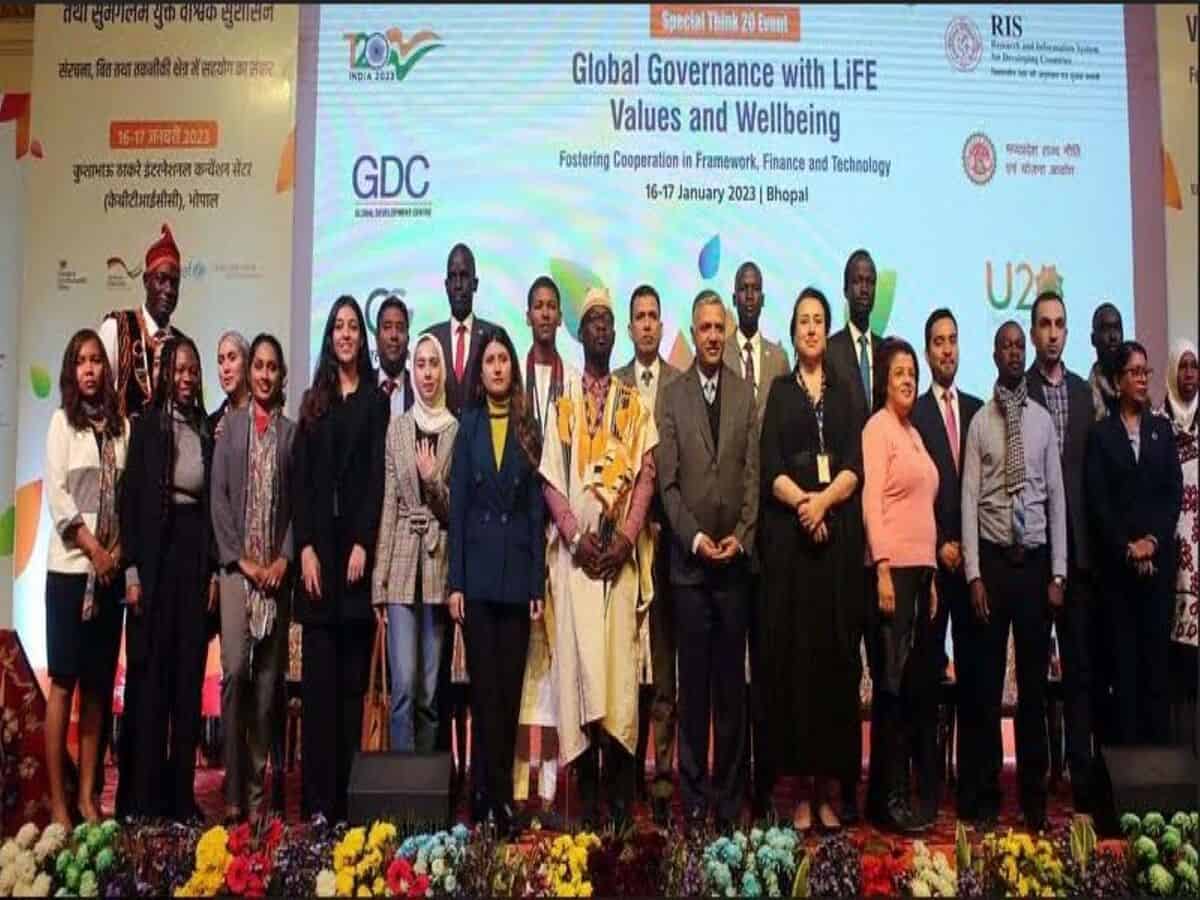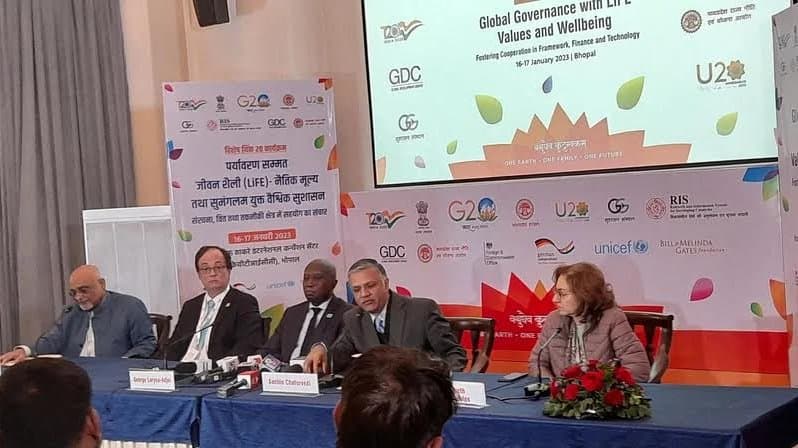
Bhopal: The two-day Think 20 convention which was being held under the aegis of G20 concluded in Bhopal on Tuesday. Conclusion of the convention was marked by issuance of the Bhopal Declaration and a review of the last ten declarations of G20 as well.
The key recommendations of the Bhopal Declaration include the need for development transformation to support transitions towards ‘Global South and Global Governance for LiFE (Lifestyle for Environment), and responsible consumption.
Addressing the press conference, director general for Research and Information System for Developing Countries, Professor Sachin Chaturvedi, Dr Jeorge (UNICEF), and Andre from Brazil spoke on future goals and the various important suggestions which came during the Think 20 meeting.
The Bhopal Declaration says that the development path pursued hitherto has threatened the existence of other species, biodiversity and environment. There is a real danger that if we don’t make substantial progress towards universal value based systems and institutions some of the past gains in the quality of human life will be reversed. Therefore adoption of LiFE is deeply connected to value systems and ethical approaches.
Development strategies
It was also discussed at the press conference that values and ethical considerations should not be treated as residual elements in formulating development strategies; rather they should form the core of the substantive practices in production, technology and financial transactions.
G20 may consider establishing a network of researchers and advocacy groups to build databases, document best practices and share expertise for collating inputs for the new development paradigm. Developed countries urgently need to fulfil their commitment towards funding Sustainable Development Goals (SDG) progress in developing countries especially LDCs (Least Developed Countries) and Small Island Developing States (SIDS).

Trade, climate change, environment issues take centre stage
The subjects related to trade, triangular cooperation, climate change, environment, financing, sustainable development goals, inclusive model for development, changing geo-political scenario etc. dominated the various sessions of the two day Think 20 meeting organised under the aegis of G20.
In the plenary session 5, South Asia Watch on Trade, Economics and Environment (SAWTEE), Nepal Chairman Dr. Posh Raj Pandey threw light on the adverse impact of changing geopolitical, geo-economic environment on trade and value chain.
Advanced technology, reducing the cost of communication and transport systems along with universal access to digitization will be helpful in empowering the value chain, said Pandey. He also stressed on South-South, North-South triangular cooperation.
Oluseun Andrew Ishola, from Centre for Management Development (CMD), Nigeria was of the opinion that promoting global business in a participatory environment rather than a competitive one is the need of the hour. “Today it is clear to us that the competitive environment has not been able to bring positive results in global well-being,” he further stated.
The Economic Policy Research Foundation, Turkey Professor Sait Akman virtually participated in the session. He highlighted the different types of Global Value Chains.
Representatives of various countries gave their views in the round table discussion on ‘Global South and Global Governance for LiFE.
The panellists included Dr. Fahmida Khatun, Executive Director, Centre for Policy Dialogue, Bangladesh; Senior Investigator, National Council for Scientific and Technical Research, Argentina, Dr. Gladys Lechini; Director, Foreign Policy and International Development Cooperation, Indonesia, Dr. Wisnu Utomo and Lead Coordinator, Policy Bridge Tank Programme, South Africa, Pamela Gopaul.
‘Think 20’ discusses environment, social disparity
Meanwhile, environment, economic and social disparity, climate, use of natural resources for society were among the subjects which were taken up for discussion on the very first day of the ‘Think 20’ meeting held under the aegis of G20 in the state capital on Monday.
Dr. Mario Pezzini, former Director of the OECD Development Centre, Paris, speaking of the problems in different countries stressed on the need for social transformation. He was addressing the first plenary session on “Life, Value and Development Transformation”.
Presiding over the session, President of First India Foundation and former Vice-Chairman of Niti Aayog Dr Rajeev Kumar said: “Not deviating from the values, we have to walk towards the path of development”.
Centre for Professional Ethics UCLan, United Kingdom and Director of the School of Law, UCLon, Cyprus Director Prof. Doris Shcroeder shed light on the challenges being faced by G20.
Prof. Riatu Qibthiyyah, Director of the Institute of Economic and Social Research, University of Indonesia, said that India has got a better opportunity to share the innovations being done in the country with the world.
Lead Chair Professor Li Xiaoyan, Agricultural University of China stressed on the need to address the growing disparity between rural and urban areas.
Dr. Iqbal Singh Sewiya, Director, Institute of South Asian Studies (ISAS) Singapore said the industrial revolution has changed the world. Research should be done with a view to develop systems using technology with life values to bring about transformation.
International Children’s Fund (UNICEF), South Asia Regional Director George Laryea Adjei said that the use of technology will bring new ideas towards conducting environmental and welfare work. G20 Chief co-ordinator of the Government of India Harshvardhan Shringla said that he was happy to see the smart and clean city Bhopal. India’s presidency in G20 will prove to be important.
